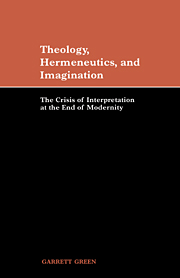Book contents
- Frontmatter
- Contents
- Preface
- 1 Theological hermeneutics in the twilight of modernity
- Part I The modern roots of suspicion
- 2 The scandal of positivity: the Kantian paradigm in modern theology
- 3 Against purism: Hamann's metacritique of Kant
- 4 Feuerbach: forgotten father of the hermeneutics of suspicion
- 5 Nietzschean suspicion and the Christian imagination
- Part II Christian imagination in a postmodern world
- Appendix: Hamann's letter to Kraus
- Bibliography
- Index
4 - Feuerbach: forgotten father of the hermeneutics of suspicion
Published online by Cambridge University Press: 22 September 2009
- Frontmatter
- Contents
- Preface
- 1 Theological hermeneutics in the twilight of modernity
- Part I The modern roots of suspicion
- 2 The scandal of positivity: the Kantian paradigm in modern theology
- 3 Against purism: Hamann's metacritique of Kant
- 4 Feuerbach: forgotten father of the hermeneutics of suspicion
- 5 Nietzschean suspicion and the Christian imagination
- Part II Christian imagination in a postmodern world
- Appendix: Hamann's letter to Kraus
- Bibliography
- Index
Summary
… an object first takes on its true intrinsic dignity when the sacred nimbus is stripped off; for as long as a thing or being is an object of religious worship, it is clad in borrowed plumes, namely, the peacock feathers of the human imagination.
FeuerbachWe … need be afraid of no Feuerbach.
BarthLudwig Feuerbach appears condemned to play the historical role of “influence.” We read other thinkers of the nineteenth century today – Hegel, for example, or Kierkegaard, or Marx – for their ideas, for the insights they continue to bring to contemporary issues even at the end of the twentieth century. But Feuerbach is nearly always studied primarily because of the influence he has exercised on other thinkers – the ones who still attract readers today. James Livingston, for instance, concludes his treatment of Feuerbach in Modern Christian Thought by noting how his “influence on modern thought far exceeds that of thinkers of much greater reputation and popularity.” He mentions Feuerbach's contributions to now familiar themes in existentialism, to the psychological theories of Sigmund Freud and Erich Fromm, and to the I–Thou philosophy of Martin Buber, before coming at last to the “most significant of all” the influences: the role that Feuerbach's ideas played in the development of Karl Marx's thought both early and late.
- Type
- Chapter
- Information
- Theology, Hermeneutics, and ImaginationThe Crisis of Interpretation at the End of Modernity, pp. 83 - 108Publisher: Cambridge University PressPrint publication year: 1999

